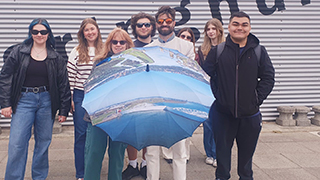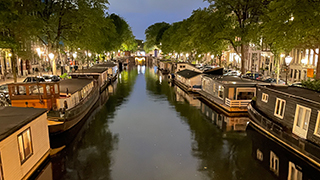Environmental Studies Students Visit the Netherlands to Learn About Climate Resilience and Sustainability
Monday, August 25, 2025

Jacob Weger, Ph.D., and students outside of the Maeslantkering storm surge barrier (as big as two Eiffel Towers), part of the famous Dutch "Delta Works."
This past May, the Environmental Studies program ran its first study abroad course, “Climate Adaptation in the Netherlands,” led by lecturer and now Program Director, Jacob Weger, Ph.D. The two-week program was an extension of Weger’s Spring 2025 course “Complex Coasts & Deltas” (cross-listed with Anthropology) which focuses on the complex sustainability challenges facing the world’s highly populated coastal and delta regions.
The small, watery and densely populated country of the Netherlands sits in the combined delta of three of Europe’s major rivers – the Rhine, Meuse and Scheldt – and as such has long been vulnerable to flooding and more recently the effects of climate change, especially sea-level rise. Yet the Netherlands has emerged as a global leader in adapting to these challenges and integrating sustainability across all sectors of society, developing specialized solutions that are often shipped to other countries (including Vietnam, Bangladesh and even the U.S.) to help them address similar issues.
Over the course of two weeks, students in Weger’s class (Emma Potts, Julia Chryc, Helen Jakubowicz, Ewa Pekala, Jared Scharfstein and Ethan Sosa) visited sites including Amsterdam, Rotterdam, the Hague and Delft to learn about how such measures are being implemented in the Netherlands as well as Dutch activities globally. They observed the country’s famous canals, dikes, windmills and polders used for water management (namely “keeping their feet dry”), witnessed the operation of large-scale coastal protection measures known as the “Delta Works,” explored community sustainability initiatives across the city of Amsterdam, visited a man-made island used for wildlife conservation in the middle of a former inland sea and received a private tour of Schoonschip, a floating neighborhood in Amsterdam that is now a model for like-minded projects around the world. They also met with scientists, researchers and engineers applying Dutch solutions abroad and discussed the many challenges and complexities this involves.

Amsterdam canal lit up at night.
Additional highlights included the World Museum in Amsterdam, which explores the ongoing legacy of Dutch colonialism; the Nieuwe Institute in Rotterdam, a museum of contemporary art, architecture and design; an outing to the beach to see the “Zandmotor,” an innovative method to halt coastal erosion by taking advantage of natural processes; as well as visits to the Van Gogh Museum and Anne Frank House. When they weren’t busy learning and sightseeing, students could be found exploring the charming canals and cobblestone backstreets of Amsterdam, or sitting down for a relaxing afternoon “borrel” over cheesy fried croquettes and cold drinks.
What’s next for Environmental Studies abroad, you ask? The program is currently exploring the possibility of a study abroad trip to Costa Rica for next spring or summer, though exact dates are yet to be announced. Join us as we travel to learn first-hand what is being done in other parts of the world to create and maintain a healthy, resilient and sustainable world.
Categories: Nation and World






